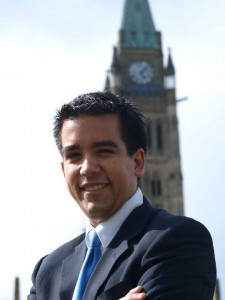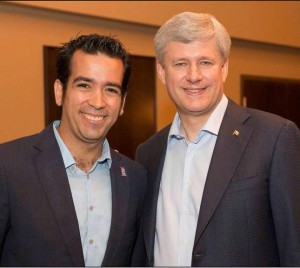Shifting left: The Conservatives’ future in Canada

Chris Crawford, Conservative supporter, wants the party to take this opportunity to rebuild. Photo credit: Chris Crawford.
The Liberal victory in Newfoundland and Labrador on Monday night is an indication that the wave of Liberal support from the October federal election is carrying over to the provincial governments, a leading pollster says.
David Coletto, CEO of Abacus Data, said Stephen Harper’s lingering unpopularity probably influenced the Newfoundland outcome.
“Mr. Harper’s personal popularity and the way that his government was seen, probably had some impact on how people vote provincially,” Coletto said. “Although it is not always a perfect relationship, particularly in Ontario and in Atlantic Canada.”
The Liberals won a landslide majority in Newfoundland with 31 seats. The PCs managed to hold onto nine after being in power for the past 12 years.
Coletto said that with Stephen Harper no longer at the helm of the Conservative Party – and without a newly elected leader – Conservatives across the country have been left in a bit of a vacuum.
Monday’s result came as no surprise to Chris Crawford, who’s campaigned for the federal Conservatives for more than a decade.
“In a way we were and in a way we weren’t shocked,” said the 29-year-old. During the last federal election, Crawford volunteered in the Nipissing-Timiskaming riding as a campaign manager.
“It’s just the nature of how governments are elected,” he said.

Chris Crawford, a member of the Conservative Party since 2006, with former Prime Minister Stephen Harper. Photo credit: Chris Crawford.
But Crawford said Monday’s result was still a disappointing loss and the turnout gave grounds for reflection.
“The next step is to rebuild the party and make sure we have closer governance across the country after the next round of provincial elections,” he said.
For Jim Farney, a professor at University of Regina who specializes in Conservatism in Canada, the results point to how a new generation of voters didn’t connect with Harper’s style of governance. He said the Conservatives will have to renew themselves.
“Can’t they have sunny ways too?” Farney asked.
This shift away from Conservative parties at the provincial level began before Monday’s election in Newfoundland. In 2011, more than half of provinces were lead by Progressive Conservative governments. Today there are no provincial governments with the word Conservative in their name, even though some argue the governments in Saskatchewan and British Columbia are Conservative in orientation.
But even if there are no current PCs in power, that doesn’t mean Conservative ideology doesn’t have supporters, said Paul Wilson, a political science professor at Carleton University and former chief of staff for the Conservative Party in the 2011 election.
Wilson said the Liberal government in British Columbia lead by Christy Clark, had a strong relationship with the Harper government. Also, Premier Brad Wall – the leader of the right-leaning Saskatchewan Party – was linked with Harper in the former Canadian Alliance.
While the Newfoundland loss indicates Canadians are shifting left on the political spectrum, in the long term, governments tend to change cyclically, Wilson said.
Coletto, from Abacus, said the shift we’re witnessing now at the provincial level could also change direction. “Typically in many provinces they change between Liberals and Conservatives,” he said. “At this point, we can see a swing against Conservative parties.”
But Coletto said if support can shift one way, it could shift the other. If Justin Trudeau’s government becomes unpopular, as governments will, it could affect citizens’ feelings toward the Liberal government the next time they’re at the polls.
He was echoed by Farney, from the University of Regina.
“In the Manitoba election in the spring, if the Conservatives run a half-decent campaign they will win there,” said Farney. “I keep waiting for the Ontario Tories to run a half-decent campaign and defeat the Liberals.”
